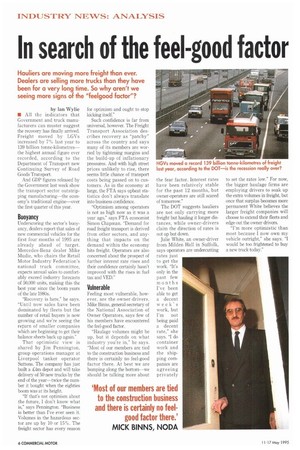In search of the feel-good factor
Page 8

If you've noticed an error in this article please click here to report it so we can fix it.
Hauliers are moving more freight than ever. Dealers are selling more trucks than they have been for a very long time. So why aren't we seeing more signs of the "feelgood factor"?
by Ian Wylie • All the indicators that Government and truck manufacturers can muster suggest the recovery has finally arrived. Freight moved by LGVs increased by 7% last year to 139 billion tonne-kilometresthe highest annual figure ever recorded, according to the Department of Transport new Continuing Survey of Road Goods Transport.
And GDP figures released by the Government last week show the transport sector outstripping manufacturing—the economy's traditional engine—over the first quarter of this year.
Buoyancy
Underscoring the sector's buoyancy, dealers report that sales of new commercial vehicles for the first four months of 1995 are already ahead of target. Mercedes-Benz dealer Mike Mudie, who chairs the Retail Motor Industry Federation's national truck committee, expects annual sales to comfortably exceed industry forecasts of 50,000 units, making this the best year since the boom years of the late 1980s.
"Recovery is here," he says. "Until now sales have been dominated by fleets but the number of retail buyers is now growing and we're seeing the re/urn of smaller companies which are beginning to get their balance sheets back up again."
That optimistic view is shared by Jim Pennington, group operations manager at Liverpool tanker operator Suttons. The company has just built a £4m depot and will take delivery of 50 new trucks by the end of the year—twice the number it bought when the eighties boom was at its height.
"If that's not optimism about the future, I don't know what is," says Pennington. "Business is better than I've ever seen it. Volumes in the hazardous sector are up by 10 or 15%. The freight sector has every reason for optimism and ought to stop kicking itself."
Such confidence is far from universal, however. The Freight Transport Association describes recovery as "patchy" across the country and says many of its members are worried by tightening margins and the build-up of inflationary pressures. And with high street prices unlikely to rise, there seems little chance of transport costs being passed on to customers. As in the economy at large, the FTA says upbeat statistics don't always translate into business confidence.
"Optimism among operators is not as high now as it was a year ago," says FTA economist Simon Chapman. "Demand for road freight transport is derived from other sectors, and anything that impacts on the demand within the economy hits freight. Operators are also concerned about the prospect of further interest rate rises and their confidence certainly hasn't improved with the rises in fuel tax and VED."
Vulnerable
Feeling most vulnerable, however, are the owner-drivers. Mike Binns, general-secretary of the National Association of Owner Operators, says few of his members have encountered the feel-good factor.
"Haulage volumes might be up, but it depends on what industry you're in," he says. "Most of our members are tied to the construction business and there is certainly no feel-good factor there. At best we are bumping along the bottom—we should be talking more about the fear factor. Interest rates have been relatively stable for the past 12 months, but owner-operators are still scared of tomorrow."
The DOT suggests hauliers are not only carrying more freight but hauling it longer distances, while owner-drivers claim the direction of rates is not up but down.
Julie White, an owner-driver from Milden Hall in Suffolk, says operators are undercutting rates just to get the work. "It's only in the past few months I've been able to get a decent week's work, but I'm not being paid a decent rate," she says. "I do container work and the shipping companies are agreeing privately to set the rates low." For now, the bigger haulage firms are employing drivers to soak up the extra volumes in freight, but once that surplus becomes more permanent White believes the larger freight companies will choose to extend their fleets and edge out the owner drivers.
"I'm more optimistic than most because I now own my vehicle outright," she says. "I would be too frightened to buy a new truck today."




































































































